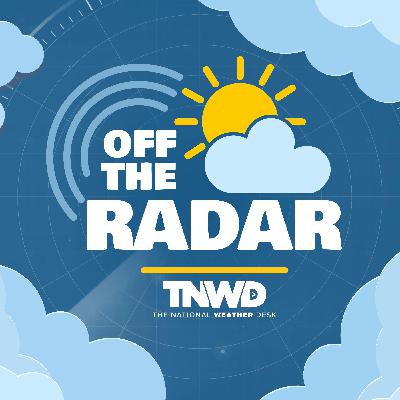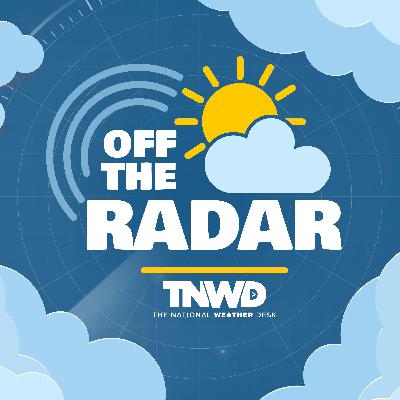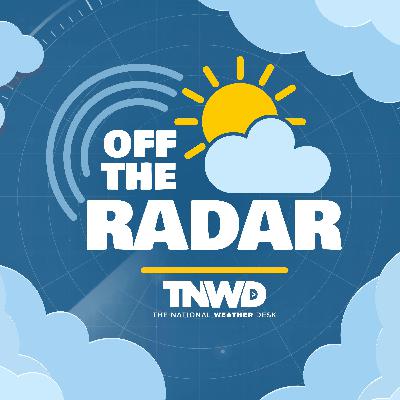Discover Off the Radar
Off the Radar

Off the Radar
Author: The National Weather Desk
Subscribed: 15Played: 250Subscribe
Share
© Sinclair Broadcast Group
Description
Join National Weather Desk Meteorologist Emily Gracey every week as she leads listeners on an exciting voyage exploring a diverse range of topics related to weather, climate, space, and beyond. The podcast offers exclusive interviews with leading experts on topics that you wouldn't usually come across in a typical weather broadcast. It’ll enlighten, entertain, and educate, whether you’re a novice weather follower to the most passionate weather geek.
125 Episodes
Reverse
Seven years after losing her home to Hurricane Michael, content creator Meghan Lynn has found an unexpected calling: making hurricane preparedness go viral.
She lives just outside of Tallahassee and experienced the Category 5 hurricane firsthand. Rather than let it defeat her, she used this traumatic experience as an opportunity. Now she educates millions through social media. The secret to her perseverance as well as her social media success? Humor, relatability, and conversations that actually engage her audience.
In this episode, Meghan shares her survival story and why humor might be the key to keeping people safe. We explore how a creator with lived experience is connecting to audiences in ways traditional hurricane warnings haven't - and how her unique take on emergency preparedness is keeping countless people safe.
In May 2025, the U.S. government shut down Climate.gov and fired hundreds of NOAA employees, censoring vital climate change information that American taxpayers had already funded. This shocking act of climate science censorship mirrors a disturbing pattern in American history that goes back 75 years. From the lead poisoning cover-up of the 1920s to today's climate information blackout, this episode is all about America's troubling history of prioritizing corporate profits over public health and scientific truth.
This week, join host Emily Gracey as she interviews Rebecca Lindsay, a former Climate.gov program manager who was fired during the government crackdown. Lindsay reveals what critical climate information was lost when the website disappeared, why this represents an unprecedented attack on scientific transparency, and how the shutdown impacts educators, journalists, and concerned citizens everywhere.
But this isn't just a story about censorship—it's about resistance and resilience. Lindsay and other former NOAA scientists and communicators refuse to stay silent. They're launching Climate.us, an independent nonprofit platform to restore public access to the climate information Americans deserve. Learn how this group is fighting back against government censorship and working to save climate data that may help save lives across the country.
Maria Torres turned her childhood fascination with Puerto Rican storms into a groundbreaking career at the National Hurricane Center, where she serves as the first female Public Affairs Officer and bilingual spokesperson. In this special Hispanic Heritage Month episode, Maria shares her inspiring journey from a curious child watching lightning, to becoming the trusted Spanish-language voice that delivers life-saving hurricane warnings to millions.
Maria discusses why representation matters when it comes to weather preparedness, how language barriers can become life-or-death issues during emergencies, and her vital role in ensuring that critical storm information reaches everyone who needs it.
Plus, get the inside scoop on what the National Hurricane Center's forecast team is predicting for the remainder of this hurricane season, straight from someone at the heart of the operation.
This conversation goes beyond meteorology—it's about equity, access, and making sure every voice gets heard when the storm hits.
For decades, fall foliage maps were mostly guesswork. Then meteorologist Evan Fisher, founder of Explore Fall, revolutionized leaf peeping by combining weather data with real-time observations to create the most accurate fall forecasts ever made. In this episode, Evan explains how this year's unusual weather is affecting autumn colors nationwide, demonstrates how his data archive can show you exactly what fall looked like when you were a kid, and reveals how he quickly adapted his leaf-tracking technology to coordinate damage reports in Western North Carolina after Hurricane Helene hit.
In 1816, the world experienced something unthinkable: a year without summer. Mount Tambora's catastrophic eruption in Indonesia – the most powerful volcanic blast in recorded history – sent eighty times more ash than Mount St. Helens into the atmosphere, blocking sunlight globally and altering weather patterns worldwide. Thousands of miles from the volcano, people witnessed blood-red sunsets and snow falling in June. Crops failed, famine spread, and in the United States, entire populations migrated west to less-affected regions. The event reshaped America and built the Midwest into an agricultural hub. Join Emily Gracey and Brian Pietrus as they chat with Dr. Kevin Anchukaitis from the University of Arizona. He'll reveal how tree rings and paleoclimate data unlock this incredible story and explore Tambora's far-reaching effects on agriculture, migration, and even art.
As the 2025 hurricane season ramps up, we are bringing back this fan favorite from last year.
This month marks the 64th anniversary of when Hurricane Carla battered the coast of Texas, instantly becoming one of the most intense and damaging hurricanes recorded in the state. But as houses and ships were battened down and residents fled the storm, some individuals with the Weather Bureau did the unthinkable: they strapped themselves into the cockpit of an airplane and flew directly into the eye of the storm! It started as a bar bet between pilots and became the standard procedure for observing and measuring hurricanes to provide life-saving data for researchers on the ground. Join me this week as I interview Daniel Tyson and Jonathan Shannon from NOAA to talk about what it’s like to fly into a hurricane and how technology has evolved since Hurricane Carla!
This week marks 20 years since Hurricane Katrina devastated New Orleans and the surrounding areas. It's a sobering reminder that human lives are at the center of weather forecasting and climate conversations. Today, Emily is going off the radar with Traci Curry, director of the new National Geographic docuseries "Hurricane Katrina: Race Against Time." We'll also hear from Shelton Alexander, a New Orleans resident who survived the hurricane inside the Superdome and wrote a heartbreaking poem about his experience. Join us for a powerful conversation about what weather and climate mean for the people who experience them firsthand.
This summer's devastating wildfire season has sent smoke across county, state, and even international borders, affecting air quality thousands of miles away from the flames. Host Emily Gracey dives deep into the science behind the haze, exploring why wildfire seasons are stretching longer each year and how a changing climate is literally adding fuel to the fire.
You'll discover the invisible dance between smoke and weather systems that determines whether your city wakes up under clear skies or a blanket of particulates. Climate Central's Shel Winkley explains the wildfire-climate connection, while Michigan meteorologist Alec Kownacki makes sense of those color-coded air quality measurements on your phone – what they really mean, how they're calculated, and why the difference between "moderate" and "unhealthy" could determine whether you take that morning jog or stay inside.
See Privacy Policy at https://art19.com/privacy and California Privacy Notice at https://art19.com/privacy#do-not-sell-my-info.
For nearly four decades, Jim Cantore has been America's most trusted voice in extreme weather. But in this deeply personal conversation, Emily sits down with the meteorological icon to explore the man behind the legend.
Jim opens up about his New England childhood and the path that led him to The Weather Channel's early days, when cable television was still finding its footing. He shares candid stories from those formative years that shaped both his career and his character.
The conversation takes a heartfelt turn as Jim discusses the personal storms that tested him more than any hurricane ever could—his family's health battles and the challenge of being a father while spending countless days on the road chasing weather across the country. With remarkable honesty, he reveals how these experiences changed his perspective on what truly matters.
Jim and Emily also dive into the future of hurricane coverage in an evolving media landscape, and he addresses head-on the swirling rumors of retirement.
This episode captures Jim at his most genuine—vulnerable about his struggles, proud of his journey, and refreshingly human. Expect laughter, heartache, and revelations that show why this broadcasting legend has remained so beloved by colleagues and viewers alike.
See Privacy Policy at https://art19.com/privacy and California Privacy Notice at https://art19.com/privacy#do-not-sell-my-info.
When the cameras start rolling, there’s one person film and TV productions can’t do without — the meteorologist. This week on Off the Radar, host Emily Gracey is joined by The National Weather Desk’s summer intern Ben Tomfohrde to talk with Brett Zweiback, the on-set weather expert trusted to keep high-budget shoots safe when the weather turns.
From hit TV shows like Stranger Things and The Walking Dead to blockbuster films like Jurassic World, Brett’s job is to make sure thunderstorms, lightning, or high winds don’t bring million-dollar days to a halt. He also shares how his skills extend beyond entertainment, as a forensic meteorologist working on legal cases and insurance investigations through his company, Spot On Weather.
It’s a fascinating look at the high-stakes world of TV and film production, weather safety, and the unexpected places a career in meteorology can take you.
See Privacy Policy at https://art19.com/privacy and California Privacy Notice at https://art19.com/privacy#do-not-sell-my-info.
When Hurricane Helene knocked out cell towers for weeks and Texas floods left communities without power or internet, one piece of technology kept working: NOAA Weather Radio. In this essential emergency preparedness episode, we explore why this 50-year-old analog technology is more critical than ever in our digital age.
The episode opens with a powerful story from Dr. Neil Jacobs, incoming NOAA Administrator, about how a weather radio saved his life during a 1996 tornado. But this isn't just about nostalgia – it's about survival when modern technology fails.
Host Emily Gracey sits down with Bruce Jones from Midland Weather Radios to discuss the fascinating history of weather radio, practical setup and usage tips, and address swirling rumors about the future of the NOAA weather radio network. You'll learn why backup communication systems are essential, how weather radios work when cell service fails, and why every emergency kit needs this reliable technology.
Whether you're a prepper, weather enthusiast, or just want to keep your family safe, this episode reveals why the humble weather radio deserves a spot alongside your smartphone in your emergency preparedness arsenal.
See Privacy Policy at https://art19.com/privacy and California Privacy Notice at https://art19.com/privacy#do-not-sell-my-info.
On July 4th, 2024, flash flooding in the Texas Hill Country claimed multiple lives, including children, leaving a nation searching for answers. In this essential episode, host Emily Gracey talks with Dr. Kim Klockow McClain - NOAA meteorologist, social scientist, and mother - about how we move forward from tragedy.
Dr. McClain explains why flash flood warnings are more complex than they appear, addresses the conspiracy theories that emerge after disasters, and offers hope for better science, communication, and community healing. This conversation focuses on learning from loss and building resilience in an era of extreme weather.
See Privacy Policy at https://art19.com/privacy and California Privacy Notice at https://art19.com/privacy#do-not-sell-my-info.
For a lot of people, summertime means beach season. But depending on where you live, you may have seen an increase in reported shark encounters over the past few years. In this episode, we're going off the radar with Greg Metzger, the Chief Field Coordinator for the shark work conducted through the South Fork Natural History Museum on Long Island. We'll be discussing how our changing climate is causing an increase in shark/human interactions, debunking myths about sharks, and telling us how beachgoers can stay safe this summer. Guest hosted by Brian Pietrus!
See Privacy Policy at https://art19.com/privacy and California Privacy Notice at https://art19.com/privacy#do-not-sell-my-info.
This week, Emily is going off the radar back to 1863! She'll be talking to Dr. Jon Nese, an Associate Head of Penn State University's Program in Meteorology and Atmospheric Science. Dr. Nese isn't just a meteorologist; he's also studied and written about how weather influenced the American Civil War! We'll explore how different weather elements affected everything about the Gettysburg campaign, discover the surprising place where Dr. Nese found the meteorological evidence that brings this story to life, and discuss why his deep dive into 160-year-old weather records serves as a powerful reminder of just how critical reliable weather observation is in our modern world.
See Privacy Policy at https://art19.com/privacy and California Privacy Notice at https://art19.com/privacy#do-not-sell-my-info.
Craig Setzer has a unique job - he's Royal Caribbean's Chief Meteorologist. In this episode that originally aired in 2024, Craig shares what it's like predicting storms, waves, and wind along constantly moving cruise routes. Craig offers a behind-the-scenes look at how he works with ship captains to keep passengers and crew safe and comfortable.
See Privacy Policy at https://art19.com/privacy and California Privacy Notice at https://art19.com/privacy#do-not-sell-my-info.
In September 1989, NOAA hurricane hunters became the first to encounter Hurricane Hugo—and nearly became its first victims. Flying at 1,500 feet, they hit G-Forces in the Category 5 storm's eyewall, losing control of the aircraft nearly plunging it into the ocean.
The flight was so violent that some crew members never flew into another hurricane. Today we'll hear from Dr. Jeff Masters, the meteorologist who was on board that historic flight, then explore the science of measuring turbulence with Dr. Josh Wadler from Embry-Riddle, who has developed a metric to quantify how rough these flights get—and confirms this remains the most violent hurricane hunter flight on record.
See Privacy Policy at https://art19.com/privacy and California Privacy Notice at https://art19.com/privacy#do-not-sell-my-info.
A storm surge causes coastal flooding, widespread devastation, and death. When a hurricane hits, the winds can blow away homes; but historically, a storm surge has been the deadliest part of a hurricane in the US. It can sweep houses right off their foundations and lead to a greater loss of life than hurricane winds alone. To better understand this phenomenon - and to grasp just how devastating and deadly it can be - we're going off the radar with Dr. “Hurricane Hal” Needham to discuss the biggest storm surges in American history.
See Privacy Policy at https://art19.com/privacy and California Privacy Notice at https://art19.com/privacy#do-not-sell-my-info.
June 15th is Father's Day, and this week we're going off the radar with author Kelly V. Porter. She's honoring her late father, Alonzo Smith Jr., who was one of the first Black American meteorologists in history and the subject of Kelly's book, The Weather Officer. Join Kelly and Emily for an emotional and eye-opening historical perspective on the history of meteorology and race in America as we pay tribute to this barrier-breaking dad.
See Privacy Policy at https://art19.com/privacy and California Privacy Notice at https://art19.com/privacy#do-not-sell-my-info.
When Adam Met isn’t playing bass or recording albums with his brothers in the sensational pop-rock band AJR, he finds novel ways of keeping busy. Adam founded a renewable energy and climate policy nonprofit, earned a PhD in Human Rights Law, and he also teaches at Columbia University. In his spare time, Adam Met recently wrote a book, Amplify, about activism in the art and music scenes. Climate change and global climate policy are hugely important topics to Adam. This week, Emily is going off the radar with Met to discuss music as activism, the global climate crisis, and what needs to be done to ensure corporations don’t “Burn the House Down” on our planet.
See Privacy Policy at https://art19.com/privacy and California Privacy Notice at https://art19.com/privacy#do-not-sell-my-info.
As the 2025 Atlantic hurricane season begins, Jamie Rhome, Deputy Director of the National Hurricane Center, joins Off The Radar to discuss how hurricane science and communication have evolved over his 26-year career.
While forecasting accuracy has reached new heights, getting life-saving information to communities remains a critical challenge. Jamie reveals the Hurricane Center's lesser-known fieldwork—quiet missions to storm-affected areas where teams gather crucial data from survivors about their evacuation decisions.
This episode explores groundbreaking research into hurricane mortality, the technological and communication breakthroughs that have transformed the field. . Jamie also shares practical safety advice and how he's preparing his own home for potential impacts this upcoming season.
See Privacy Policy at https://art19.com/privacy and California Privacy Notice at https://art19.com/privacy#do-not-sell-my-info.








Did not know a podcast supposedly about the science of weather could be so "woke" . . . And the weather too . . .
The #1 source of global methane is cows ? Smells like BS to me. Is this podcast going to be primarily woke or more factual based ?